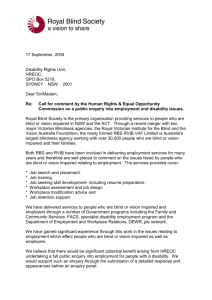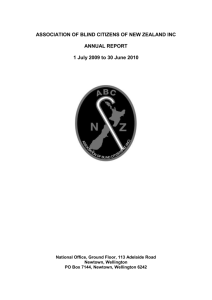MAIN ACTIVITIES CARRIED OUT BY ONCE AND ITS
advertisement
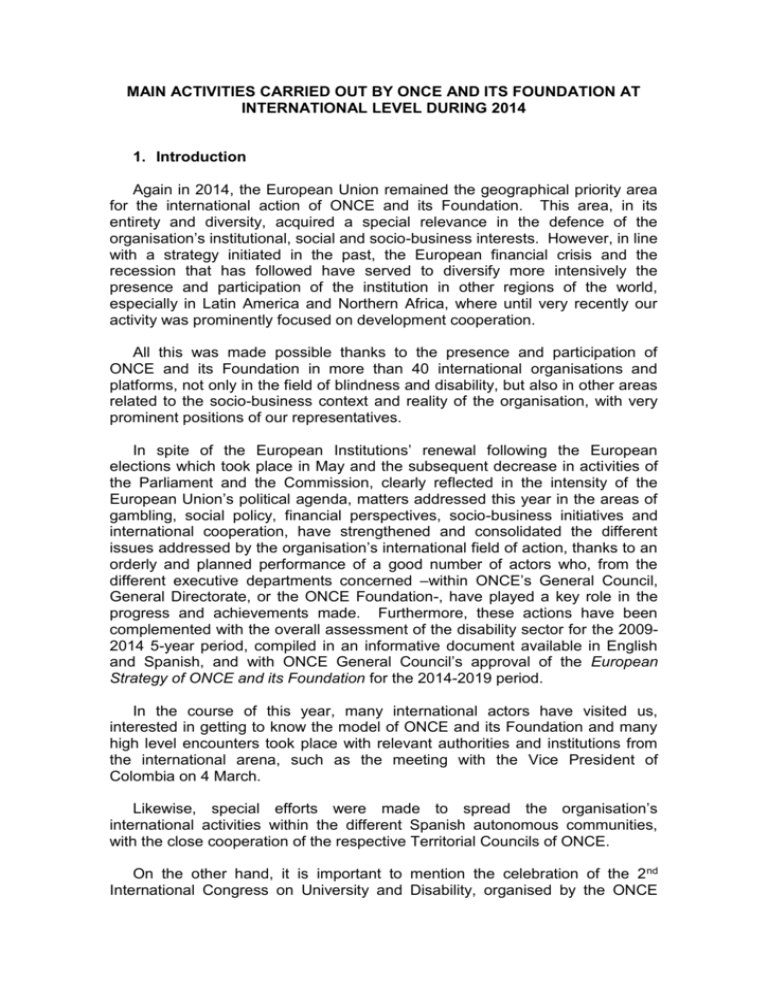
MAIN ACTIVITIES CARRIED OUT BY ONCE AND ITS FOUNDATION AT INTERNATIONAL LEVEL DURING 2014 1. Introduction Again in 2014, the European Union remained the geographical priority area for the international action of ONCE and its Foundation. This area, in its entirety and diversity, acquired a special relevance in the defence of the organisation’s institutional, social and socio-business interests. However, in line with a strategy initiated in the past, the European financial crisis and the recession that has followed have served to diversify more intensively the presence and participation of the institution in other regions of the world, especially in Latin America and Northern Africa, where until very recently our activity was prominently focused on development cooperation. All this was made possible thanks to the presence and participation of ONCE and its Foundation in more than 40 international organisations and platforms, not only in the field of blindness and disability, but also in other areas related to the socio-business context and reality of the organisation, with very prominent positions of our representatives. In spite of the European Institutions’ renewal following the European elections which took place in May and the subsequent decrease in activities of the Parliament and the Commission, clearly reflected in the intensity of the European Union’s political agenda, matters addressed this year in the areas of gambling, social policy, financial perspectives, socio-business initiatives and international cooperation, have strengthened and consolidated the different issues addressed by the organisation’s international field of action, thanks to an orderly and planned performance of a good number of actors who, from the different executive departments concerned –within ONCE’s General Council, General Directorate, or the ONCE Foundation-, have played a key role in the progress and achievements made. Furthermore, these actions have been complemented with the overall assessment of the disability sector for the 20092014 5-year period, compiled in an informative document available in English and Spanish, and with ONCE General Council’s approval of the European Strategy of ONCE and its Foundation for the 2014-2019 period. In the course of this year, many international actors have visited us, interested in getting to know the model of ONCE and its Foundation and many high level encounters took place with relevant authorities and institutions from the international arena, such as the meeting with the Vice President of Colombia on 4 March. Likewise, special efforts were made to spread the organisation’s international activities within the different Spanish autonomous communities, with the close cooperation of the respective Territorial Councils of ONCE. On the other hand, it is important to mention the celebration of the 2 nd International Congress on University and Disability, organised by the ONCE Foundation for Cooperation and Social Inclusion of Persons with Disabilities on 27 and 28 November in Madrid, which turned into an international meeting forum for universities and the disability world and could be followed in English and Spanish on the Internet. A few days before that event, the International Exhibition of Assistive Technology for People with Visual Disabilities (TIFLOINNOVA 2014) took place, organised by the ONCE Centre for Research, Development and Implementation of Technologies for the Blind (CIDAT). 2. Gambling In general terms, we can say that the international activities in this sector have focused, on one hand, on the active follow-up of policies carried out or negotiated in the area of gambling under the European Union Presidencies of Greece and Lithuania, coinciding with the end and renewal of European Institutions mandates; on the other hand, on the development of already existing business initiatives already existing in the international sphere or at assessment and analysis stage; and, finally, on the activities derived from our own active participation in international lottery organisations and platforms in which ONCE belongs. As relevant activity in this field, it is worth mentioning in particular the signing of the addendum to the cooperation agreement between European Lotteries (EL) and the European Disability Forum (EDF), in the course of the meeting on 10 October at ONCE General Council Headquarters of the Presidents of both institutions, who showed their commitment towards moving forward in the implementation at European level of the UN Convention on the Rights of Persons with Disabilities. With this addendum, both institutions requested their respective members to show their interest for the development of a European pilot project, which will focus on employment and training of people with disabilities and/or on increasing social awareness-raising on disability, based on transferable successful national experiences. This will have the technical assistance of ONCE and its Foundation. 3. Social policies Through the close follow-up, the planning, development and actions of a lobbying strategy, coordinated between ONCE, its Foundation and the Spanish Committee of Representatives of Persons with Disabilities (CERMI), in cooperation with the European Disability Forum, the European Economic and Social Committee, and also through bilateral contacts with MEPs and senior officials of the European Commission, we have tried to make progress in initiatives and commitments undertaken for our sector in the Agenda 2020. It has been an arduous and complicated challenge given the General Elections process in the European Parliament on 25 May 2014. To that end, ONCE and its Foundation continued applying a twin-track approach, paying special attention to initiatives related to disability (non-discrimination, employment, accessibility, etc.), and also to initiatives related to social economy (European statutes for associations, social services of general interest, state aid, etc.). All this has been expressed directly through drafting of positions and concrete responses to consultations launched this year by the European Commission, in a significantly smaller number due to the renewal process in the European Institutions. In spite of this, our priorities have been to get off the ground the European Accessibility Act, outstanding since 2010; the ratification by the European Union of the WIPO Marrakesh Treaty; the regulation of silent cars; the revision of air transport and public procurement. The publication in June of the report by the European Union on the implementation of the UN Convention on the Rights of Persons with Disabilities deserves a special mention. It will be examined by the Convention’s International Monitoring Committee in its 13th and 14th sessions, which will take place in Geneva in April and August 2015, respectively. 4. Financial perspectives The ONCE Foundation has followed closely national negotiations on the Rules that will control the spending of the 325 million Euros from the Community budget for Structural and Investment Funds corresponding to the 2014-2020 period, making sure that they include social aspects. 5. International cooperation FOAL is our organisation’s flagship with regard to international cooperation. This year, it has continued designing and implementing inclusive education and training and employment programmes for blind people in Latin America, as well as co-financing many projects geared towards achieving their full inclusion and citizenship in their respective countries. Furthermore, in 2014 FOAL has initiated its international volunteer campaign (“Looking for Helping Hands”) and its campaign for a bank of optical aids and typhlotechnical materials (“Become a FOAL donor”), involving this way the joint participation of the organisation’s members and workers in this important international cooperation commitment. All these efforts have allowed ONCE, through FOAL, to remain being a model for international development cooperation in the field of disability, as well as an example of solidarity efforts for other institutions carrying out cooperation work in other regions of the world. Within its general scope of action, in 2014 FOAL has continued working on programmes focused on educational inclusion, professional training and employment, taking into consideration the need for decentralisation of resources, gender equality and direct intervention in rural areas, from the specificities of each country and with the direct participation of the beneficiaries, through their representative organisations. All these activities in the field of international cooperation in Latin America have been complemented with our organisation’s long-lasting support to other blind people in different regions of the world. In this sense, cooperation has continued with the Association of Blind and Partially People in Portugal (ACAPO), through the granting of training, board and lodging grants to two students at the ONCE School of Physiotherapy. A training seminar on employment of blind people has also been organised for ACAPO’s technical staff. In any case, the most relevant cooperation activity with ACAPO has been the co-financing granted for the setting-up of the Union of Portuguese-Speaking Blind People, which was launched with the presence of the Presidents of blind associations from the countries concerned: Angola, Brazil, Cape Verde, Guinea-Bissau, Mozambique, Portugal and East Timor. Finally, blind children in Saharan Refugee Camps in Tinduf, Algeria continue being beneficiaries of our international cooperation, they are distributed between the five specific schools, one for each refugee camp (Smara, Aousserd, El Aioun, 27th of February and Dakhla), thanks to the selfless work of professionals from the ONCE Educational Resource Centre in Catalonia. To this end, this year’s support materialized in the shape of training of local professionals, donation of special material and some financial support for project coordination at local level. Thanks to all these efforts, school attendance of blind children in the region is much higher than that of their sighted peers. Lastly, in 2014 support has been given also to organisations of the blind in the Balkans, in the shape of training of professionals and technical assessment in the areas they requested.
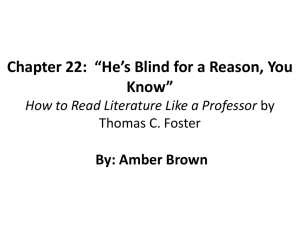



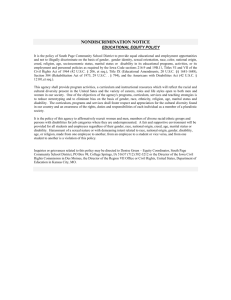

![You can the presentation here [Powerpoint, 1.01MB]](http://s2.studylib.net/store/data/005417570_1-0810139cfc2485ebcaf952e0ae8bb49a-300x300.png)

